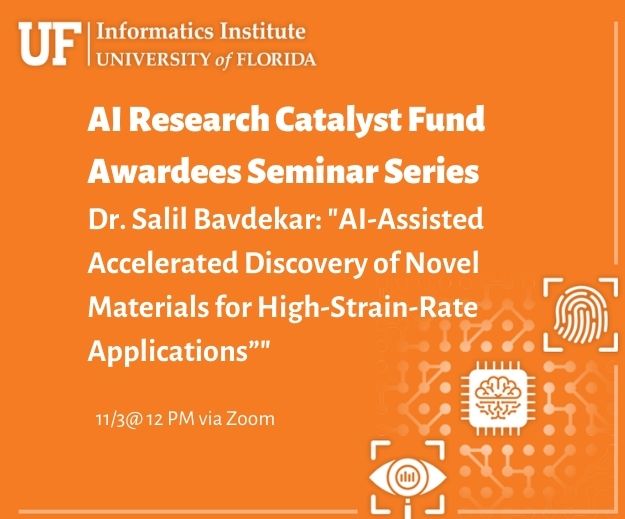AI Research Catalyst Fund Awardees Virtual Seminar Series – Salil Bavdekar

- This event has passed.
AI Research Catalyst Fund Awardees Virtual Seminar Series – Salil Bavdekar
November 3, 2021 @ 12:00 pm - 1:00 pm

AI Research Catalyst Fund Awardees Virtual Seminar Series
“AI-Assisted Accelerated Discovery of Novel Materials for High-Strain-Rate Applications”
by Dr. Salil Bavdekar
Postdoctoral Research Associate, Laboratory for Dynamic Response of Advanced Materials (LDRAM)
PI: Dr. Ghatu Subhash
Wednesday, November 3, 2021
ABSTRACT:
Exploring and understanding the processing-structure-property-performance (PSPP) relationships is the backbone of material science research. Significant time and money have been spent by the international materials community to identify structural modifications or alternatives for an improved structural ceramic for dynamic loading conditions. These approaches, primarily through experiments and simulations, generally produce marginal improvements and are slow and expensive. However, the “big data” generated by these studies – and other experiments, simulations, and theoretical models over the last century – has generated new avenues for material science through material informatics, which can accelerate the discovery and development of novel materials. Traditional scientific techniques move from left to right in the PSPP linkage (e.g., material structure defines the properties), and the relationships in this direction are often many-to-one. However, material design requires “inverse models” that flow from right to left (e.g., desired performance leads to required properties). Traditional optimization techniques to explore this design space – such as design of experiments – are inefficient for this task as they are exploitative rather than exploratory and hence, suffer from low predictability. Artificial Intelligence (AI)-based materials informatics approaches are much more suited to decipher these many-to-one relationships via fast and accurate forward models, which in turn can help to realize the more difficult inverse models of materials discovery and design.
In this pilot study, we present a high-throughput strategy to design compositionally complex ceramics (C3) for high strain-rate applications by establishing design rules that permit accelerated discovery. The first phase – i.e., the ‘exploitation’ phase – focuses on well-understood, design spaces (e.g., Si-C-N, Al-O-N systems), by identifying new stoichiometries and structures. Evolutionary structure searches coupled to density-functional theory (DFT) calculations are applied to predict the ground state and metastable structures within a given system. These searches aim to not only find structures with low energies (i.e., on or close to the convex hull), but also maximize the targeted property (in this case, hardness). Hence, the algorithm serves to both, generate and filter data within the given system to produce structures with the desired stability and properties. The data obtained throughout these structure searches is exploited in a machine-learning model that is trained on the fly and can accelerate the structure prediction and provide an accurate and efficient surrogate model of the energy (and property) landscape. Through this framework, we aim to develop chemical design rules to answer the fundamental question of how chemical additions to the structure affect its hardness and stability. While the pilot study will focus primarily on high-strain-rate applications, the material design strategy developed in the long-term project will be applicable to materials design in numerous fields.
Bio:
Salil Bavdekar is a postdoctoral research associate at the Laboratory for Dynamic Response of Advanced Materials (LDRAM) at the University of Florida. Working under the supervision of Prof. Subhash, his research interests include material design and discovery, analytical solid mechanics, failure analysis and experimental high-strain-rate characterization of advanced materials. He graduated from the University of Florida with a Ph.D. in Mechanical Engineering in 2019, during which he developed analytical models for the impact and penetration resistance of ceramic materials. In addition to the computational research, he also is involved in experimental studies to characterize the failure modes of advanced materials including ceramics composites and graphene nanocomposites.
Wednesday, November 3, 2021
12:00PM – 1:00PM
Via Zoom
RSVP below. Instructions to attend talk via Zoom will be emailed to you.

